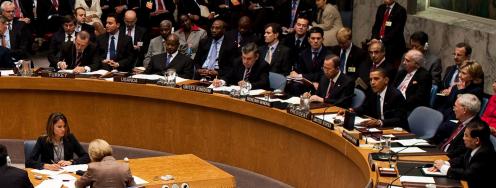Scottish Independence and the United Kingdom’s Nuclear Future
On the radar: Potentially baseless boomers; UK weighs options; Nukes “gut” hsip budget; Moniz and Gottemoeller on CTBT; Iran talks to continue; and an Unacknowledged alliance.
On the radar: Potentially baseless boomers; UK weighs options; Nukes “gut” hsip budget; Moniz and Gottemoeller on CTBT; Iran talks to continue; and an Unacknowledged alliance.
September 17, 2014 | Edited by Jacob Marx and Will Saetren
If yes to Scotland, no to nukes - With a “Yes” vote in tomorrow’s independence referendum, Scotland may take a major step towards removing deeply unpopular nuclear weapons from its borders. The UK bases its four nuclear missile submarines, 58 U.S.-made trident missiles, and an estimated 160 warheads in Scotland. The “Yes” movement seeks removal of these weapons by 2020. Read the position statement here. http://bit.ly/1tAvRUS
Relocation - “A Scottish vote for independence would present a significant challenge to the rest of the UK’s nuclear forces, which currently rely upon Scottish bases for operational support,” write Hugh Chalmers and Malcolm Chalmers in their analysis of nuclear weapons relocation for the Royal United Services Institute.
--”The various challenges of relocation would probably trigger a wider national discussion in the rest of the UK on whether or not the strategic benefits of retaining nuclear weapons exceeded the costs involved…While the technical and financial challenges presented by Scottish independence would influence this discussion, they would not be severe enough to dictate it.” Read the full report (pdf). http://bit.ly/1BgiXRu
Budgets and basing - “In an era of shirking U.K. defense budgets, preserving the boomers and the U.K. nuclear deterrent could be financially unreasonable given the extra cost of developing permanent basing those submarines elsewhere in the U.K. The split could also make the U.K.’s SSBN Successor SSBN program more difficult to fund,“ writes Sam Lagrone for USNI. Read the full story here. http://bit.ly/1maXuFI
Meanwhile, in Congress - “Ahead of Thursday’s referendum on Scottish independence, U.S. policy makers are speaking out – albeit tentatively – in support of a united United Kingdom,” reports Rachel Oswald for CQ Roll Call.
--“American policy makers worry that a Britain diminished by the loss of a third of its land mass, 8 percent of its population and 10 percent of its armed forces – along with the base in southwestern Scotland for its Trident nuclear submarines – could be a less effective ally in the standoff with Russia and confrontation with the Islamic State.” Read the full story here. http://bit.ly/1maM4l8
Nukes sink ships - Without extra funding from Congress, the production of 12 new ships to replace the Ohio-class submarines could “gut” the Navy’s shipbuilding budget for more than a decade, Secretary of the Navy Raymond Mabus said during a speech at the Council on Foreign Relations in Washington, D.C. “It has the potential to gut the rest of our shipbuilding programs.”
--According to an article by Yasmin Tadjdeh in National Defense, one plan that is being considered to avoid such cuts is to create The National Sea-Based Deterrence Fund — which would separate the payment of the submarines from the Navy’s regular budget. “The only two solutions are for Congress to either create the fund or to increase the Navy’s shipbuilding funds,” said Mabus. “That’s the hard math of it.” Read the full story here. http://bit.ly/1uDRZAm
CTBT commitment - “The United States remains committed to ratification and entry into force of the Comprehensive Nuclear-Test-Ban Treaty, along with the monitoring and verification regime. And this Administration will continue making the case for U.S. CTBT ratification to build bipartisan support,” said Secretary of Energy Ernest Moniz in Remarks at the U.S. Institute of Peace.
--”Global nuclear security is of utmost importance to the United States. To achieve this goal, we need to advance arms control initiatives, such as the CTBT, and to ensure that we continue to develop the science and technology that allow us to monitor arms control implementation.” Full remarks available here. http://1.usa.gov/1uTBz54
CTBT revival- “CTBT is a key part of leading nuclear weapons states toward a world of diminished reliance on nuclear weapons, reduced nuclear competition, and eventual nuclear disarmament,” said Rose Gottemoeller, Under Secretary for Arms Control and International Security at an event on Monday at the U.S. Institute of Peace. See the full remarks here. http://1.usa.gov/1pjqOV8
Tweet - @MarkHibbsCEIP: Russia pushing back on #IAEA pursuit of #Syria nuclear allegations@Reuters @carnegienpp http://reut.rs/1p0hiqM
Shot in the arm - Diplomats seek to inject momentum into negotiations on Iran’s nuclear program when they meet this week in New York, as the November deadline for striking a deal looms, writes Kambiz Foroohar for Bloomberg. Negotiators still need to agree on the size of Iran’s enrichment programs, and the level of inspections to be carried out by the IAEA.
--“The talks in New York are being overshadowed by the broadening confrontation with Islamic State, a conflict which has dragged in Iran and its leading regional opponents,” writes Foroohar. “While Tehran-backed Shiite militias are helping to fight the militants in Iraq, the U.S. has rallied a group of Sunni-led nations behind its call for military action, some of them hostile to Iran.” Read the full story here. http://bloom.bg/1s5AbPU
Tweet - @BulletinAtomic: Where are the world's nuclear weapons deployed? Our latest Nuclear Notebook: http://ow.ly/Bzi7H
The unacknowledged alliance - “Iran and the U.S. are allies against ISIS but aren’t ready to admit it yet,” argues Joshua Keating in Slate. Earlier this week Ayatollah Ali Khamenei rebuffed an overture by the U.S. Secretary of State, John Kerry, who said that the U.S. would be open to talks with Iran about the crisis in Iraq. Khamenei told reporters that, “I saw no point in cooperating with a country whose hands are dirty and intentions murky.”
--“Washington and Tehran are on the same team in Iraq,” writes Keating. ”At a certain point, the military forces battling the same enemy in the field might start to wonder how long it will take the politicians giving them orders to get on the same page.” Read the full opinion here. http://slate.me/Xhm4sm
Quick Hits:
--“B-2 Pilot’s Lessons For LRSB, America’s New Bomber,” by Lt. Col. Jeff Schreiner in Breaking Defense. http://bit.ly/1Djyq4n
--”Boeing and SpaceX Tapped To Free NASA from Russian Launches,” by Tim Fernholz in Quartz. http://bit.ly/1qfwqjs
Events:
--International Atomic Energy Agency Board of Governors meeting. Sept. 15-19 in Vienna.
--”Iran and Its Neighbors: Regional Implications for U.S. Policy of a Nuclear Agreement.” Welcoming remarks by Jane Harman, Director, President, and CEO, Woodrow Wilson Center and an introduction by Ambassador William Luers. Featuring panelists Ambassador Thomas Pickering, Ambassador Frank Wisner, Paul Pillar and Barnett Rubin. Sept 17. at 1pm. Full details here. http://bit.ly/1qdICXL
--“Deal or No Deal: How To Negotiate Successful Nuclear Agreements” with Robert Litwak, Michael Krepon, and Joel Wit at the Wilson Center. Sept 17 2:30-4:30pm. Details here. http://bit.ly/1qJueEu
--“The Contribution of the National Laboratory System to U.S. National Security” discussion with Paul Hommert, Charles McMillan and Adam Schwartz. Sept. 17th from 5:30-7:00pm at George Washington University. Details here. http://bit.ly/1q6Y9IP
--“Understanding an Iranian Nuclear Deal,” featuring David Albright and Jon Wolfsthal. Thursday, Sept. 18, 10:00-11:30am, James Martin Center for Nonproliferation Studies, 1400 K Street, NW, Suite 1250, Washington, DC. Full details here. http://bit.ly/1m84WRR
--"The Regional Role of Post-Agreement Iran" by Paul Pillar, Researcher, Security Studies Program, Georgetown University. Center for International and Strategic Studies at Maryland Forum. Thursday, Sept. 18 from 12:15-1:30pm in room 1203 Van Munching Hall, College Park, Maryland. Full details. http://bit.ly/1u1Z77d
--Scottish Independence Referendum, Sept. 18. http://bit.ly/1jkLr2Z
--"The Regional Implications of a deal with Iran” with Ken Pollack, Farideh Farhi, John Garver, Amb. Chas Freeman, and Haleh Esfandiari. Sept. 29, 2:30pm at the Washington Marriott. Part of the NIAC Leadership Conference. Details here. http://bit.ly/XvQffI
--Eric Schlosser discusses his book, Command and Control: Nuclear Weapons, the Damascus Accident, and the Illusion of Safety, at the World Affairs Council of Northern California. Sept. 29 in San Francisco. Details here. http://bit.ly/1qrePcW



